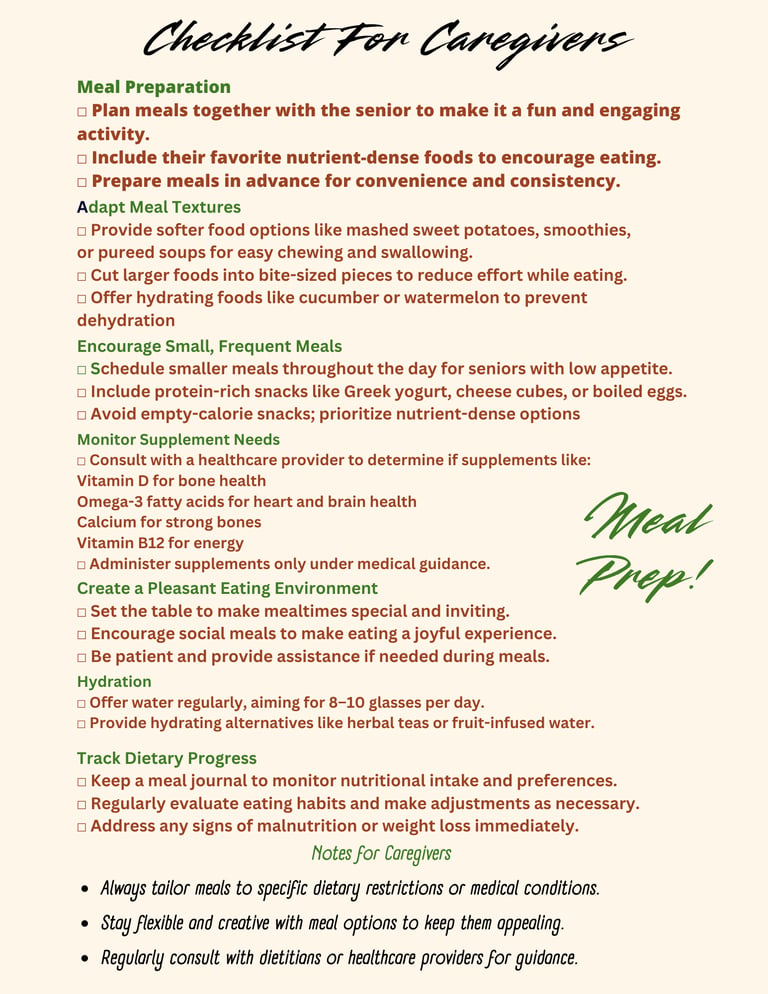Join Our Community & Get Your Free Health Starter Kit
Navigating the Journey: Challenges and Solutions for Caregivers.
Caring for a loved one is a journey filled with both hardships and rewards. Here are solutions to help navigate this demanding yet deeply meaningful role."Navigating the Journey: Challenges and Solutions for Caregivers."
9/8/2025


Being a caregiver is a profound act of love and dedication, but it’s no secret that the role comes with its fair share of challenges. Whether you’re caring for an aging parent, a loved one with special needs, or someone recovering from an illness, the responsibilities can be both emotionally and physically taxing. In this blog post, we’ll explore some of the common hurdles caregivers face—and, importantly, offer practical solutions to help you thrive on your caregiving journey.
Understanding the Challenges
1. Emotional Overload
Caregiving often means shouldering the emotional weight of watching a loved one struggle. Feelings of guilt, frustration, and sadness are common, and over time, these can accumulate, leading to burnout.
2. Physical and Mental Fatigue
The day-to-day tasks, everything from managing medications to providing round-the-clock attention—can be exhausting. Many caregivers report sleep disturbances and chronic fatigue, which can impact both their physical health and mental clarity.
3. Financial and Logistical Stress
Balancing the costs associated with caregiving, including medical bills and home modifications, can be daunting. Many caregivers also juggle a full-time job and personal responsibilities, adding another layer of complexity to an already challenging role.
4. Social Isolation
The demands of caregiving can sometimes lead to feelings of isolation. It’s common to see your social life take a backseat as you prioritize the needs of your loved one, leaving you feeling disconnected from friends and family.
5. Lack of Recognition and Support
Caregivers often work behind the scenes with little acknowledgment for their hard work. This lack of recognition can contribute to feelings of being undervalued and overwhelmed.
Practical Solutions for Caregivers
The good news is that while these challenges are real, there are also effective solutions to help you navigate them:
1. Prioritize Self-Care
It might sound cliché, but taking care of yourself is essential. Whether it’s a few minutes of meditation, a walk in the park, or indulging in a hobby, setting aside time for yourself can help recharge your batteries. Remember, self-care isn’t selfish—it’s a necessary part of being an effective caregiver.
2. Build a Support Network
You’re not alone in this journey. Consider joining caregiver support groups, either in-person or online, where you can share experiences, advice, and encouragement. These groups can provide emotional support and practical tips from people who truly understand what you’re going through.
3. Utilize Respite Care Services
Respite care offers temporary relief from caregiving responsibilities, allowing you to take a much-needed break. Whether it’s a few hours or a few days, respite care can help reduce stress and prevent burnout. Look into local services or ask healthcare providers for recommendations.
4. Establish a Routine and Set Boundaries
Creating a structured routine can help manage your time more effectively, ensuring that both your loved one’s needs and your personal well-being are met. Setting boundaries—such as designated “me time” or limits on how much you can give—can prevent you from becoming overwhelmed.
5. Seek Professional Help
Sometimes, the challenges you face may require the guidance of a professional. Therapists, counselors, or even financial advisors can offer strategies tailored to your unique situation. Don’t hesitate to reach out for professional support when needed.
6. Educate Yourself
Knowledge is power. Educating yourself about the condition or challenges your loved one faces can not only empower you but also help you make informed decisions about their care. This can alleviate some of the stress and uncertainty that often accompanies caregiving.
The Role of Technology and Community Resources
Modern technology and community resources can play a pivotal role in easing the burden on caregivers. Mobile apps can help manage medication schedules, doctor’s appointments, and even track the daily health status of your loved one. Community centers, local health agencies, and non-profit organizations often offer resources, workshops, and even financial aid to support caregivers.
Celebrating the Caregiver’s Journey
While the challenges of caregiving are undeniable, it’s also important to celebrate the small victories. Each day you provide care is a testament to your strength, compassion, and resilience. Remember to acknowledge your achievements—no matter how small they may seem. This positive reinforcement can boost your morale and remind you of the invaluable role you play.
Meal Preparation
Checklist for Care Givers


